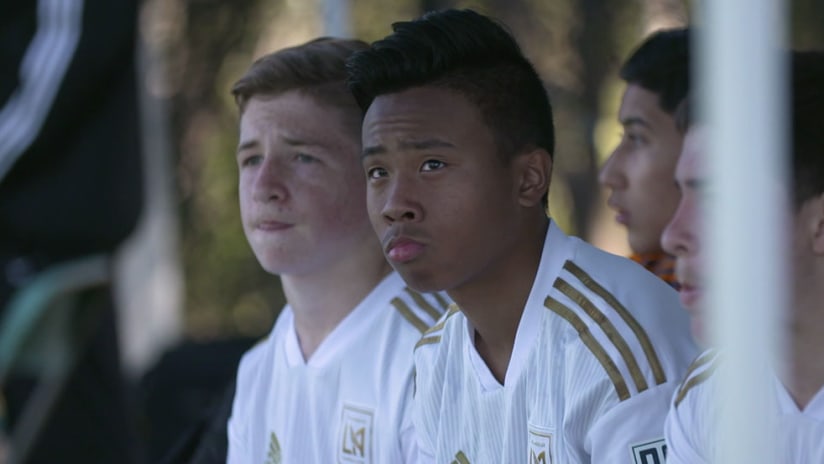This could be the year for MLS in Concacaf Champions League. Sure, no MLS team arrived to the final of this year’s competition, and there’s work to do to gain regional supremacy. But when MLS teams consistently begin lifting the big-eared trophy as Liga MX clubs wonder what went wrong, we may trace that success back to 2019.
This year sees the first U-15 tournament between MLS and Liga MX teams at the Generation adidas Cup, with four MLS teams facing four Liga MX teams in a round robin. On April 20, there will be a final match between MLS’s top performer and Mexico’s top performer, each league’s second-best performer and so forth. The final will be streamed live on Twitch.
While American and Canadian teenagers have gotten tastes of international competition before, this is the first time they'll see so many matches in a condensed period against players they’ll compete with for silverware over the next decade.
This could be the preparation needed for MLS to finally break through in international competition, for players not to be daunted by clubs like Monterrey or Chivas de Guadalajara.
“I believe it,” LAFC academy director Todd Saldana said. “I believe the more we put them in those situations and expect them to be successful, but also push them to play the way we’re teaching them week-in week-out, giving them as much experience as possible, they will be comfortable come those situations at a little older age.”
It’s a philosophy that is hardly new for the Mexican teams participating. In addition to playing weekly matches prior to Liga MX first-team games, clubs also make frequent trips outside the country to take part in tournaments in South America, the United States and Africa.
“I always say players aren’t born at 18 years old. A player is built from when they’re very young. In the plan we’re drawing up in our Fuerzas Basicas, we’re already starting with kids born in 2015, 2014. Imagine that! They’re 5 years old,” said Jaiver Santamaria, the director of Leon’s Fuerzas Basicas, or academy. “So, of course, you have to adapt to the stage the player is in. You can’t work the same way with a kid who is 6 or 7 as you do with someone who is 11, 12 or who is 14 or 15 like the ones who are going to compete in this tournament in the United States. But we think it’s a really good opportunity, and you always can get better.”
MLS Vice President of player youth and development Fred Lipka said the U-15 level is the perfect time to start easing players into international competition. The Frenchman said the majority of players will simply play for fun until they’re around 13. Soon after, young players and their coaches will realize where they stand relative to other players with professional ambitions.
Some kids, Lipka said, will realize how much work still remains, while others may realize they’re not as far behind as they thought. Others, like GA Cup alumnus and current FC Dallas midfielder Paxton Pomykal, could learn they’re ready to be a professional right away, while others will know they have room for improvement.
“I think at MLS, the U-15 is a good age to have the first experience and build your first serious competitive experience,” Lipka said. “After you have U-17s and above, which to me is real-world competition. You have to benchmark (yourself) at U-16, U-17 and you also have to make a very important choice: Do you really want to be become a professional or play for passion only?
“At U-16, U-17, you are basically making the decision to know if you are hunting for a contract in the professional world and staying at an MLS club to get this contract over the next few years.”
We’ve seen plenty of players signing homegrown contracts in MLS at 15 or 16. Many have contributed right away or in the year or two following putting pen to paper.
To arrive at that point, U.S. soccer had to alter its development timeline. Getting players into professional teams after they graduate college is too late. While MLS academy systems may not be as extreme as those in Guanajuato that are evaluating kindergartners, teams at the U-15 GA Cup have recognized the importance of getting players into programs early on.
“I think these types of competitions – credit to MLS too for creating these competitions for us – but it is also the type of stuff we would be seeking,” said Saldana. “We know if we really want to have a player in the academy ready at an early stage, which also includes having a guy ready to possibly play for the national teams and possibly get more international competition, then we are going to have to start earlier. But we’re also going to have to do it in a proactive way where we’re willing to play our type of soccer against them, not be afraid to possess the ball, in fact attack them. Whereas maybe in the past if we knew if we were going to play a team of this level we would be there, even in my era, mostly to defend."
That’s partially why Mexican sides were so eager for the U-15 GA CUp .
Santamaria said the main reason Leon accepted the invitation was simply the honor of being invited to a tournament of this caliber. He’s also looking forward, though, to how his individual players respond to challenges they may not have faced before with MLS teams bringing different wrinkles than ones they’re accustomed to seeing against other Mexican sides.
“We always try to teach lessons in all phases of the game, different models of play," the Leon director said. "Above all, we’re really interested with how the players resolve the problems that emerge in a game on their own. Obviously it has to go along with the club’s philosophy or what the manager decides, but it’s also a way of testing that in competition. You learn from everything.
“We know that in other countries, football is played differently, and that always makes a player more complete, to have faced that competition where the game is set up in a different way, especially when it comes in a formative stage.”
Both Saldana and Santamaria stressed that performances and progress are far more important than results. That said, they’re also hoping to see victories as well.
LAFC already has lifted a similar trophy, winning the 2018 U-13 Concacaf Champions League. For Saldana, tournaments like that one and this GA Cup experience give the players the taste of international success they need to win the senior-level CCL when they’re in the first team.
“My fantasy in that was that some day one of those players will be playing in the Concacaf Champions League for LAFC,” he said. “And it won’t be the first time ... they’ve played in a competition against the better Concacaf sides, and it will feel normal and natural to be able to compete with them."














